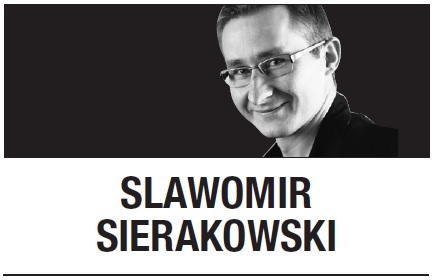[Slawomir Sierakowski] The twilight of EU foreign policy
By Korea HeraldPublished : Jan. 29, 2020 - 17:15
 Reporting on a recent conference in Berlin to discuss the conflict in Libya, one of Germany’s largest newspapers, Frankfurter Allgemeine Zeitung, notes that, “the days when America dominated the Middle East are over.”
Reporting on a recent conference in Berlin to discuss the conflict in Libya, one of Germany’s largest newspapers, Frankfurter Allgemeine Zeitung, notes that, “the days when America dominated the Middle East are over.” For more than a decade, the United States has been pulling back, forcing Europe to unfurl its own protective umbrella, either through the European Union or through the foreign policies of individual member states. It is now clear that the second option is winning out. Recent developments in Iran and Libya show that the EU has ceased to be a relevant force in international affairs.
After all, it is generally forgotten that the 2015 Iran nuclear deal included not only the P5+1 -- the US, China, Russia, France, and the United Kingdom (the five permanent members of the United Nations Security Council) plus Germany -- but also the EU. And for good reason: while the EU regards that deal as its greatest diplomatic victory, since the US abandoned the agreement in May 2018, France, Germany, and the UK have been the ones working to salvage it. The EU has mostly stuck to issuing bland press statements, which have the unintended effect of confirming its lack of real influence.
The situation in Libya is symptomatic of the larger problem. Both Turkey and Russia have now involved themselves in that country’s civil war (on opposing sides) to further their own national interests, in the process threatening to unleash a flood of refugees.
How have European leaders responded to these developments? German Chancellor Angela Merkel traveled to Moscow to meet with Russian President Vladimir Putin, French President Emmanuel Macron consulted with Putin over the phone, and no one bothered with the EU. As the Financial Times explains, “Germany is keen to send a broader message by showing that multilateral peace efforts can still deliver results, despite the growing disconnect between the US and Europe and the influence of authoritarian leaders such as Mr. Putin and (Turkish President Recep Tayyip) Erdogan.”
One might think that the shortest road to multilateralism leads through the EU. But at the talks in Berlin this month, European Commission President Ursula von der Leyen and the EU High Representative for Foreign Affairs and Security Policy Josep Borrell were cast as extras. The arriving foreign dignitaries were greeted by Merkel and UN Secretary-General Antonio Guterres. To be sure, the UN absolutely should assume a central (if symbolic) position in a summit geared toward international cooperation; but why couldn’t the EU play that role, too?
The problem is that Merkel faces few obstacles in circumventing the EU and taking direct action. If Germany were to pursue its policy goals through the fractious 28-member bloc, it would not secure its desired result. Yet this wasn’t always the case. As recently as 2016, the EU concluded a deal with Turkey to stem the flow of refugees into Europe, even though Germany had a significant stake in the outcome. Now, Germany prefers to act directly, as does France under Macron.
Nonetheless, in engaging with Putin and Erdogan bilaterally, Merkel and Macron are each in a significantly weaker position than the EU would be if it were taking the lead. In the case of Libya, a unified EU effort could have exploited Russia and Turkey’s divergent interests. And more broadly, simply by applying economic pressure, the EU could wield significant influence over any individual third country anywhere in the world. But to do so, it would need a common agenda and representatives who are empowered to pursue common EU interests, even when doing so might come at expense of individual member states. Without a united front, the EU cannot act effectively on the world stage.
In this respect, European leaders openly ignore the Treaty of Lisbon’s provisions on defense and security. The treaty explicitly obliges member states to conduct a common foreign policy through the European Commission, European Council, and the Office of the High Representative.
Former Polish Foreign Minister Radek Sikorski is not exaggerating when he argues that EU institutions are abandoning their obligation to conduct foreign policy for the bloc. Following the latest round of unilateral French and German diplomacy, he points out that “the leaders of the largest countries in Western Europe didn’t even think to act in accordance with the letter and the spirit of the Lisbon Treaty.”
Far from uniting Europe or safeguarding its interests, the current geopolitical confusion has deepened existing divisions among states that, individually, are losing influence in global affairs. And while American and Chinese nationalist projects may yet blow back on those countries, unilateralism on the part of European countries could break the EU altogether.
By openly eclipsing the EU’s role in foreign policy, Germany and France are weakening themselves and strengthening the likes of Russia, Turkey, and China. The recent summit in Berlin has been heralded as a success. It was also a symptom of decay.
Slawomir Sierakowski
Slawomir Sierakowski, founder of the Krytyka Polityczna movement, is director of the Institute for Advanced Study in Warsaw and senior fellow at the German Council on Foreign Relations. -- Ed.
(Project Syndicate)
-
Articles by Korea Herald







![[KH Explains] How should Korea adjust its trade defenses against Chinese EVs?](http://res.heraldm.com/phpwas/restmb_idxmake.php?idx=644&simg=/content/image/2024/04/15/20240415050562_0.jpg&u=20240415144419)












![[Today’s K-pop] Stray Kids to return soon: report](http://res.heraldm.com/phpwas/restmb_idxmake.php?idx=642&simg=/content/image/2024/04/16/20240416050713_0.jpg&u=)